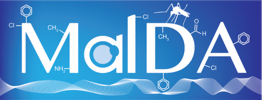Spiroindolones, a potent compound class for the treatment of malaria.
Journal:
Science (New York, N.Y.), Volume: 329, Issue: 5996Abstract:
Recent reports of increased tolerance to artemisinin derivatives–the most recently adopted class of antimalarials–have prompted a need for new treatments. The spirotetrahydro-beta-carbolines, or spiroindolones, are potent drugs that kill the blood stages of Plasmodium falciparum and Plasmodium vivax clinical isolates at low nanomolar concentration. Spiroindolones rapidly inhibit protein synthesis in P. falciparum, an effect that is ablated in parasites bearing nonsynonymous mutations in the gene encoding the P-type cation-transporter ATPase4 (PfATP4). The optimized spiroindolone NITD609 shows pharmacokinetic properties compatible with once-daily oral dosing and has single-dose efficacy in a rodent malaria model.
Courtesy of the U.S. National Library of Medicine
